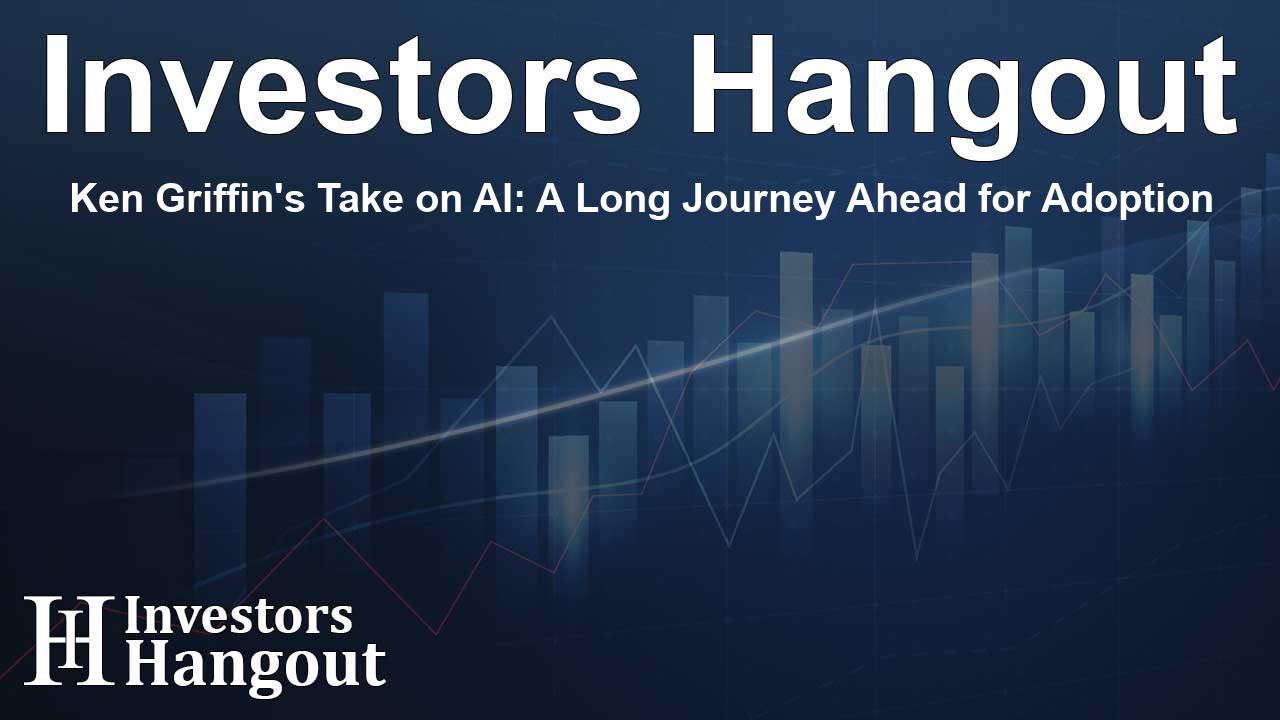Ken Griffin's Take on AI: A Long Journey Ahead for Adoption

Ken Griffin Sounds the Alarm on AI Expectations
Billionaire investor and CEO of Citadel, Ken Griffin, is urging caution surrounding the exuberance for artificial intelligence (AI). Griffin believes that the real economic impact of AI could take decades to materialize, while he also expresses concerns about immediate economic challenges such as high inflation and a declining U.S. dollar.
The AI Boom Compared to the Internet's Early Days
During his remarks at the ‘Future of Global Markets 2025’ conference, Griffin likened the current surge in AI enthusiasm to the formative years of the internet. While he acknowledges the transformative potential of AI, he cautions that investors may be overly optimistic regarding how soon this technology will achieve widespread adoption and profitability.
Griffin articulates this uncertainty, stating, “The dream may not take three or five years to play out, it could be 20 years… it can be 30 years.” He anticipates that the industry will experience a significant shakeout, much like the dot-com bubble before the true value of the technology becomes clear.
Elevating Concerns About Inflation
Shifting focus from future technology to present realities, Griffin voiced serious concerns about the U.S. economy. He pointed out that inflation rates are considerably higher than the target and exceed forecasts for the upcoming year.
The persistent inflation issue is directly linked to the dollar's declining strength, which Griffin characterized as the biggest decline seen in six months over the last 50 years. He believes this weakness is prompting both individual investors and central banks to seek alternative assets.
Investors Seeking Alternatives Amid Currency Decline
Griffin described a significant trend of investors aiming to “de-dollarize” their portfolios, gravitating towards assets like gold, which are perceived as stable alternatives to the dollar. He views this shift as a troubling indication for America's standing in global finance.
Warnings from Other Financial Leaders
Griffin's cautionary stance is echoed by fellow billionaire hedge fund mogul Paul Tudor Jones. Jones, known for predicting the 1987 stock market crash, alerted investors to prepare for what could be a tumultuous end to the current bull market.
Recently, Jones articulated that numerous factors are aligning for a potential “blow-off” rally but cautioned that the outcome may be decidedly negative. He notes that today’s technology-driven markets closely mirror the dynamics of the late 1990s dot-com boom, suggesting a repeat of history is plausible.
AI-Linked ETF Performance Snapshot
For investors considering entry into the AI space, here's a selection of notable AI-linked exchange-traded funds (ETFs) to watch:
iShares US Technology ETF (NYSE: IYW): YTD Performance 25.00%, One Year Performance 32.64%.
Fidelity MSCI Information Technology Index ETF (NYSE: FTEC): YTD Performance 22.72%, One Year Performance 22.72%.
First Trust Dow Jones Internet Index Fund (NYSE: FDN): YTD Performance 15.39%, One Year Performance 32.57%.
iShares Expanded Tech Sector ETF (NYSE: IGM): YTD Performance 25.66%, One Year Performance 34.61%.
iShares Global Tech ETF (NYSE: IXN): YTD Performance 25.33%, One Year Performance 30.44%.
Defiance Quantum ETF (NASDAQ: QTUM): YTD Performance 36.59%, One Year Performance 80.44%.
Roundhill Magnificent Seven ETF (BATS: MAGS): YTD Performance 20.68%, One Year Performance 40.23%.
The main market players include the SPDR S&P 500 ETF Trust (NYSE: SPY) and the Invesco QQQ Trust ETF (NASDAQ: QQQ), both of which traditionally track significant indices like the S&P 500 and Nasdaq 100 respectively. In premarket trading on Tuesday, SPY saw a slight decline of 0.028% to $671.42, while the QQQ fell by 0.012% to $607.64.
Griffin’s sobering analysis of the AI landscape blends an optimistic view of technology innovation with a realistic perspective on market challenges while emphasizing the need for investors to remain vigilant.
Frequently Asked Questions
1. What are Ken Griffin's views on the timeline for AI adoption?
Griffin warns that the adoption of AI technology may take decades, rather than just a few years, due to various barriers and market dynamics.
2. How does Griffin compare AI to the internet?
He sees similarities between the current AI boom and the early days of the internet, predicting a similar trajectory with significant challenges ahead.
3. What concerns does Griffin have about the US economy?
Griffin is especially concerned about inflation exceeding targets and the declining strength of the U.S. dollar, which he believes could have long-term consequences.
4. What alternatives are investors seeking amid economic uncertainties?
Given the declining dollar, many investors are looking to de-dollarize their portfolios by investing in assets like gold.
5. Who else shares similar concerns about the stock market?
Paul Tudor Jones, another investment giant, also suggests that a tumultuous end to the bull market may be on the horizon, indicating historical parallels to past market behaviors.
About The Author
Contact Caleb Price privately here. Or send an email with ATTN: Caleb Price as the subject to contact@investorshangout.com.
About Investors Hangout
Investors Hangout is a leading online stock forum for financial discussion and learning, offering a wide range of free tools and resources. It draws in traders of all levels, who exchange market knowledge, investigate trading tactics, and keep an eye on industry developments in real time. Featuring financial articles, stock message boards, quotes, charts, company profiles, and live news updates. Through cooperative learning and a wealth of informational resources, it helps users from novices creating their first portfolios to experts honing their techniques. Join Investors Hangout today: https://investorshangout.com/
The content of this article is based on factual, publicly available information and does not represent legal, financial, or investment advice. Investors Hangout does not offer financial advice, and the author is not a licensed financial advisor. Consult a qualified advisor before making any financial or investment decisions based on this article. This article should not be considered advice to purchase, sell, or hold any securities or other investments. If any of the material provided here is inaccurate, please contact us for corrections.
